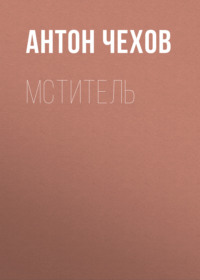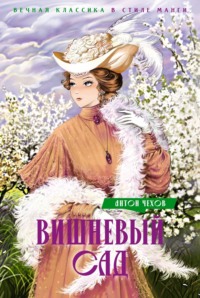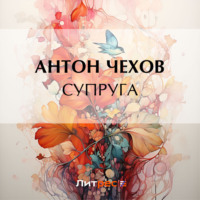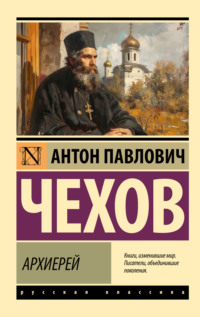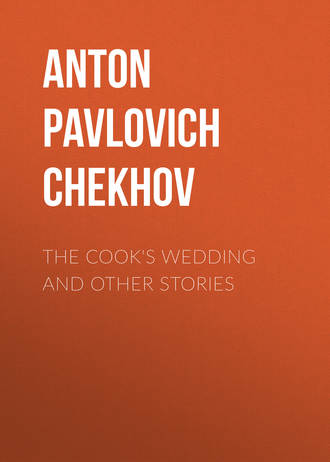 полная версия
полная версияThe Cook's Wedding and Other Stories
They are playing with zest. The greatest excitement is expressed on the face of Grisha. He is a small boy of nine, with a head cropped so that the bare skin shows through, chubby cheeks, and thick lips like a negro's. He is already in the preparatory class, and so is regarded as grown up, and the cleverest. He is playing entirely for the sake of the money. If there had been no kopecks in the saucer, he would have been asleep long ago. His brown eyes stray uneasily and jealously over the other players' cards. The fear that he may not win, envy, and the financial combinations of which his cropped head is full, will not let him sit still and concentrate his mind. He fidgets as though he were sitting on thorns. When he wins, he snatches up the money greedily, and instantly puts it in his pocket. His sister, Anya, a girl of eight, with a sharp chin and clever shining eyes, is also afraid that someone else may win. She flushes and turns pale, and watches the players keenly. The kopecks do not interest her. Success in the game is for her a question of vanity. The other sister, Sonya, a child of six with a curly head, and a complexion such as is seen only in very healthy children, expensive dolls, and the faces on bonbon boxes, is playing loto for the process of the game itself. There is bliss all over her face. Whoever wins, she laughs and claps her hands. Alyosha, a chubby, spherical little figure, gasps, breathes hard through his nose, and stares open-eyed at the cards. He is moved neither by covetousness nor vanity. So long as he is not driven out of the room, or sent to bed, he is thankful. He looks phlegmatic, but at heart he is rather a little beast. He is not there so much for the sake of the loto, as for the sake of the misunderstandings which are inevitable in the game. He is greatly delighted if one hits another, or calls him names. He ought to have run off somewhere long ago, but he won't leave the table for a minute, for fear they should steal his counters or his kopecks. As he can only count the units and numbers which end in nought, Anya covers his numbers for him. The fifth player, the cook's son, Andrey, a dark-skinned and sickly looking boy in a cotton shirt, with a copper cross on his breast, stands motionless, looking dreamily at the numbers. He takes no interest in winning, or in the success of the others, because he is entirely engrossed by the arithmetic of the game, and its far from complex theory; "How many numbers there are in the world," he is thinking, "and how is it they don't get mixed up?"
They all shout out the numbers in turn, except Sonya and Alyosha. To vary the monotony, they have invented in the course of time a number of synonyms and comic nicknames. Seven, for instance, is called the "ovenrake," eleven the "sticks," seventy-seven "Semyon Semyonitch," ninety "grandfather," and so on. The game is going merrily.
"Thirty-two," cries Grisha, drawing the little yellow cylinders out of his father's cap. "Seventeen! Ovenrake! Twenty-eight! Lay them straight.."
Anya sees that Andrey has let twenty-eight slip. At any other time she would have pointed it out to him, but now when her vanity lies in the saucer with the kopecks, she is triumphant.
"Twenty-three!" Grisha goes on, "Semyon Semyonitch! Nine!"
"A beetle, a beetle," cries Sonya, pointing to a beetle running across the table. "Aie!"
"Don't kill it," says Alyosha, in his deep bass, "perhaps it's got children.."
Sonya follows the black beetle with her eyes and wonders about its children: what tiny little beetles they must be!
"Forty-three! One!" Grisha goes on, unhappy at the thought that
Anya has already made two fours. "Six!"
"Game! I have got the game!" cries Sonya, rolling her eyes coquettishly and giggling.
The players' countenances lengthen.
"Must make sure!" says Grisha, looking with hatred at Sonya.
Exercising his rights as a big boy, and the cleverest, Grisha takes upon himself to decide. What he wants, that they do. Sonya's reckoning is slowly and carefully verified, and to the great regret of her fellow players, it appears that she has not cheated. Another game is begun.
"I did see something yesterday!" says Anya, as though to herself. "Filipp Filippitch turned his eyelids inside out somehow and his eyes looked red and dreadful, like an evil spirit's."
"I saw it too," says Grisha. "Eight! And a boy at our school can move his ears. Twenty-seven!"
Andrey looks up at Grisha, meditates, and says:
"I can move my ears too.."
"Well then, move them."
Andrey moves his eyes, his lips, and his fingers, and fancies that his ears are moving too. Everyone laughs.
"He is a horrid man, that Filipp Filippitch," sighs Sonya. "He came into our nursery yesterday, and I had nothing on but my chemise.. And I felt so improper!"
"Game!" Grisha cries suddenly, snatching the money from the saucer.
"I've got the game! You can look and see if you like."
The cook's son looks up and turns pale.
"Then I can't go on playing any more," he whispers.
"Why not?"
"Because.. because I have got no more money."
"You can't play without money," says Grisha.
Andrey ransacks his pockets once more to make sure. Finding nothing in them but crumbs and a bitten pencil, he drops the corners of his mouth and begins blinking miserably. He is on the point of crying..
"I'll put it down for you!" says Sonya, unable to endure his look of agony. "Only mind you must pay me back afterwards."
The money is brought and the game goes on.
"I believe they are ringing somewhere," says Anya, opening her eyes wide.
They all leave off playing and gaze open-mouthed at the dark window.
The reflection of the lamp glimmers in the darkness.
"It was your fancy."
"At night they only ring in the cemetery," says Andrey.
"And what do they ring there for?"
"To prevent robbers from breaking into the church. They are afraid of the bells."
"And what do robbers break into the church for?" asks Sonya.
"Everyone knows what for: to kill the watchmen."
A minute passes in silence. They all look at one another, shudder, and go on playing. This time Andrey wins.
"He has cheated," Alyosha booms out, apropos of nothing.
"What a lie, I haven't cheated."
Andrey turns pale, his mouth works, and he gives Alyosha a slap on the head! Alyosha glares angrily, jumps up, and with one knee on the table, slaps Andrey on the cheek! Each gives the other a second blow, and both howl. Sonya, feeling such horrors too much for her, begins crying too, and the dining-room resounds with lamentations on various notes. But do not imagine that that is the end of the game. Before five minutes are over, the children are laughing and talking peaceably again. Their faces are tear-stained, but that does not prevent them from smiling; Alyosha is positively blissful, there has been a squabble!
Vasya, the fifth form schoolboy, walks into the dining-room. He looks sleepy and disillusioned.
"This is revolting!" he thinks, seeing Grisha feel in his pockets in which the kopecks are jingling. "How can they give children money? And how can they let them play games of chance? A nice way to bring them up, I must say! It's revolting!"
But the children's play is so tempting that he feels an inclination to join them and to try his luck.
"Wait a minute and I'll sit down to a game," he says.
"Put down a kopeck!"
"In a minute," he says, fumbling in his pockets. "I haven't a kopeck, but here is a rouble. I'll stake a rouble."
"No, no, no… You must put down a kopeck."
"You stupids. A rouble is worth more than a kopeck anyway," the schoolboy explains. "Whoever wins can give me change."
"No, please! Go away!"
The fifth form schoolboy shrugs his shoulders, and goes into the kitchen to get change from the servants. It appears there is not a single kopeck in the kitchen.
"In that case, you give me change," he urges Grisha, coming back from the kitchen. "I'll pay you for the change. Won't you? Come, give me ten kopecks for a rouble."
Grisha looks suspiciously at Vasya, wondering whether it isn't some trick, a swindle.
"I won't," he says, holding his pockets.
Vasya begins to get cross, and abuses them, calling them idiots and blockheads.
"I'll put down a stake for you, Vasya!" says Sonya. "Sit down." He sits down and lays two cards before him. Anya begins counting the numbers.
"I've dropped a kopeck!" Grisha announces suddenly, in an agitated voice. "Wait!"
He takes the lamp, and creeps under the table to look for the kopeck. They clutch at nutshells and all sorts of nastiness, knock their heads together, but do not find the kopeck. They begin looking again, and look till Vasya takes the lamp out of Grisha's hands and puts it in its place. Grisha goes on looking in the dark. But at last the kopeck is found. The players sit down at the table and mean to go on playing.
"Sonya is asleep!" Alyosha announces.
Sonya, with her curly head lying on her arms, is in a sweet, sound, tranquil sleep, as though she had been asleep for an hour. She has fallen asleep by accident, while the others were looking for the kopeck.
"Come along, lie on mamma's bed!" says Anya, leading her away from the table. "Come along!"
They all troop out with her, and five minutes later mamma's bed presents a curious spectacle. Sonya is asleep. Alyosha is snoring beside her. With their heads to the others' feet, sleep Grisha and Anya. The cook's son, Andrey too, has managed to snuggle in beside them. Near them lie the kopecks, that have lost their power till the next game. Good-night!
THE RUNAWAY
IT had been a long business. At first Pashka had walked with his mother in the rain, at one time across a mown field, then by forest paths, where the yellow leaves stuck to his boots; he had walked until it was daylight. Then he had stood for two hours in the dark passage, waiting for the door to open. It was not so cold and damp in the passage as in the yard, but with the high wind spurts of rain flew in even there. When the passage gradually became packed with people Pashka, squeezed among them, leaned his face against somebody's sheepskin which smelt strongly of salt fish, and sank into a doze. But at last the bolt clicked, the door flew open, and Pashka and his mother went into the waiting-room. All the patients sat on benches without stirring or speaking. Pashka looked round at them, and he too was silent, though he was seeing a great deal that was strange and funny. Only once, when a lad came into the waiting-room hopping on one leg, Pashka longed to hop too; he nudged his mother's elbow, giggled in his sleeve, and said: "Look, mammy, a sparrow."
"Hush, child, hush!" said his mother.
A sleepy-looking hospital assistant appeared at the little window.
"Come and be registered!" he boomed out.
All of them, including the funny lad who hopped, filed up to the window. The assistant asked each one his name, and his father's name, where he lived, how long he had been ill, and so on. From his mother's answers, Pashka learned that his name was not Pashka, but Pavel Galaktionov, that he was seven years old, that he could not read or write, and that he had been ill ever since Easter.
Soon after the registration, he had to stand up for a little while; the doctor in a white apron, with a towel round his waist, walked across the waiting-room. As he passed by the boy who hopped, he shrugged his shoulders, and said in a sing-song tenor:
"Well, you are an idiot! Aren't you an idiot? I told you to come on Monday, and you come on Friday. It's nothing to me if you don't come at all, but you know, you idiot, your leg will be done for!"
The lad made a pitiful face, as though he were going to beg for alms, blinked, and said:
"Kindly do something for me, Ivan Mikolaitch!"
"It's no use saying 'Ivan Mikolaitch,'" the doctor mimicked him. "You were told to come on Monday, and you ought to obey. You are an idiot, and that is all about it."
The doctor began seeing the patients. He sat in his little room, and called up the patients in turn. Sounds were continually coming from the little room, piercing wails, a child's crying, or the doctor's angry words:
"Come, why are you bawling? Am I murdering you, or what? Sit quiet!"
Pashka's turn came.
"Pavel Galaktionov!" shouted the doctor.
His mother was aghast, as though she had not expected this summons, and taking Pashka by the hand, she led him into the room.
The doctor was sitting at the table, mechanically tapping on a thick book with a little hammer.
"What's wrong?" he asked, without looking at them.
"The little lad has an ulcer on his elbow, sir," answered his mother, and her face assumed an expression as though she really were terribly grieved at Pashka's ulcer.
"Undress him!"
Pashka, panting, unwound the kerchief from his neck, then wiped his nose on his sleeve, and began deliberately pulling off his sheepskin.
"Woman, you have not come here on a visit!" said the doctor angrily.
"Why are you dawdling? You are not the only one here."
Pashka hurriedly flung the sheepskin on the floor, and with his mother's help took off his shirt.. The doctor looked at him lazily, and patted him on his bare stomach.
"You have grown quite a respectable corporation, brother Pashka," he said, and heaved a sigh. "Come, show me your elbow."
Pashka looked sideways at the basin full of bloodstained slops, looked at the doctor's apron, and began to cry.
"May-ay!" the doctor mimicked him. "Nearly old enough to be married, spoilt boy, and here he is blubbering! For shame!"
Pashka, trying not to cry, looked at his mother, and in that look could be read the entreaty: "Don't tell them at home that I cried at the hospital."
The doctor examined his elbow, pressed it, heaved a sigh, clicked with his lips, then pressed it again.
"You ought to be beaten, woman, but there is no one to do it," he said. "Why didn't you bring him before? Why, the whole arm is done for. Look, foolish woman. You see, the joint is diseased!"
"You know best, kind sir." sighed the woman.
"Kind sir… She's let the boy's arm rot, and now it is 'kind sir.' What kind of workman will he be without an arm? You'll be nursing him and looking after him for ages. I bet if you had had a pimple on your nose, you'd have run to the hospital quick enough, but you have left your boy to rot for six months. You are all like that."
The doctor lighted a cigarette. While the cigarette smoked, he scolded the woman, and shook his head in time to the song he was humming inwardly, while he thought of something else. Pashka stood naked before him, listening and looking at the smoke. When the cigarette went out, the doctor started, and said in a lower tone:
"Well, listen, woman. You can do nothing with ointments and drops in this case. You must leave him in the hospital."
"If necessary, sir, why not?
"We must operate on him. You stop with me, Pashka," said the doctor, slapping Pashka on the shoulder. "Let mother go home, and you and I will stop here, old man. It's nice with me, old boy, it's first-rate here. I'll tell you what we'll do, Pashka, we will go catching finches together. I will show you a fox! We will go visiting together! Shall we? And mother will come for you tomorrow! Eh?"
Pashka looked inquiringly at his mother.
"You stay, child!" she said.
"He'll stay, he'll stay!" cried the doctor gleefully. "And there is no need to discuss it. I'll show him a live fox! We will go to the fair together to buy candy! Marya Denisovna, take him upstairs!"
The doctor, apparently a light-hearted and friendly fellow, seemed glad to have company; Pashka wanted to oblige him, especially as he had never in his life been to a fair, and would have been glad to have a look at a live fox, but how could he do without his mother?
After a little reflection he decided to ask the doctor to let his mother stay in the hospital too, but before he had time to open his mouth the lady assistant was already taking him upstairs. He walked up and looked about him with his mouth open. The staircase, the floors, and the doorposts – everything huge, straight, and bright-were painted a splendid yellow colour, and had a delicious smell of Lenten oil. On all sides lamps were hanging, strips of carpet stretched along the floor, copper taps stuck out on the walls. But best of all Pashka liked the bedstead upon which he was made to sit down, and the grey woollen coverlet. He touched the pillows and the coverlet with his hands, looked round the ward, and made up his mind that it was very nice at the doctor's.
The ward was not a large one, it consisted of only three beds. One bed stood empty, the second was occupied by Pashka, and on the third sat an old man with sour eyes, who kept coughing and spitting into a mug. From Pashka's bed part of another ward could be seen with two beds; on one a very pale wasted-looking man with an india-rubber bottle on his head was asleep; on the other a peasant with his head tied up, looking very like a woman, was sitting with his arms spread out.
After making Pashka sit down, the assistant went out and came back a little later with a bundle of clothes under her arm.
"These are for you," she said, "put them on."
Pashka undressed and, not without satisfaction began attiring himself in his new array. When he had put on the shirt, the drawers, and the little grey dressing-gown, he looked at himself complacently, and thought that it would not be bad to walk through the village in that costume. His imagination pictured his mother's sending him to the kitchen garden by the river to gather cabbage leaves for the little pig; he saw himself walking along, while the boys and girls surrounded him and looked with envy at his little dressing-gown.
A nurse came into the ward, bringing two tin bowls, two spoons, and two pieces of bread. One bowl she set before the old man, the other before Pashka.
"Eat!" she said.
Looking into his bowl, Pashka saw some rich cabbage soup, and in the soup a piece of meat, and thought again that it was very nice at the doctor's, and that the doctor was not nearly so cross as he had seemed at first. He spent a long time swallowing the soup, licking the spoon after each mouthful, then when there was nothing left in the bowl but the meat he stole a look at the old man, and felt envious that he was still eating the soup. With a sigh Pashka attacked the meat, trying to make it last as long as possible, but his efforts were fruitless; the meat, too, quickly vanished. There was nothing left but the piece of bread. Plain bread without anything on it was not appetising, but there was no help for it. Pashka thought a little, and ate the bread. At that moment the nurse came in with another bowl. This time there was roast meat with potatoes in the bowl.
"And where is the bread?" asked the nurse.
Instead of answering, Pashka puffed out his cheeks, and blew out the air.
"Why did you gobble it all up?" said the nurse reproachfully. "What are you going to eat your meat with?"
She went and fetched another piece of bread. Pashka had never eaten roast meat in his life, and trying it now found it very nice. It vanished quickly, and then he had a piece of bread left bigger than the first. When the old man had finished his dinner, he put away the remains of his bread in a little table. Pashka meant to do the same, but on second thoughts ate his piece.
When he had finished he went for a walk. In the next ward, besides the two he had seen from the door, there were four other people. Of these only one drew his attention. This was a tall, extremely emaciated peasant with a morose-looking, hairy face. He was sitting on the bed, nodding his head and swinging his right arm all the time like a pendulum. Pashka could not take his eyes off him for a long time. At first the man's regular pendulum-like movements seemed to him curious, and he thought they were done for the general amusement, but when he looked into the man's face he felt frightened, and realised that he was terribly ill. Going into a third ward he saw two peasants with dark red faces as though they were smeared with clay. They were sitting motionless on their beds, and with their strange faces, in which it was hard to distinguish their features, they looked like heathen idols.
"Auntie, why do they look like that?" Pashka asked the nurse.
"They have got smallpox, little lad."
Going back to his own ward, Pashka sat down on his bed and began waiting for the doctor to come and take him to catch finches, or to go to the fair. But the doctor did not come. He got a passing glimpse of a hospital assistant at the door of the next ward. He bent over the patient on whose head lay a bag of ice, and cried: "Mihailo!"
But the sleeping man did not stir. The assistant made a gesture and went away. Pashka scrutinised the old man, his next neighbour. The old man coughed without ceasing and spat into a mug. His cough had a long-drawn-out, creaking sound.
Pashka liked one peculiarity about him; when he drew the air in as he coughed, something in his chest whistled and sang on different notes.
"Grandfather, what is it whistles in you?" Pashka asked.
The old man made no answer. Pashka waited a little and asked:
"Grandfather, where is the fox?"
"What fox?"
"The live one."
"Where should it be? In the forest!"
A long time passed, but the doctor still did not appear. The nurse brought in tea, and scolded Pashka for not having saved any bread for his tea; the assistant came once more and set to work to wake Mihailo. It turned blue outside the windows, the wards were lighted up, but the doctor did not appear. It was too late now to go to the fair and catch finches; Pashka stretched himself on his bed and began thinking. He remembered the candy promised him by the doctor, the face and voice of his mother, the darkness in his hut at home, the stove, peevish granny Yegorovna.. and he suddenly felt sad and dreary. He remembered that his mother was coming for him next day, smiled, and shut his eyes.
He was awakened by a rustling. In the next ward someone was stepping about and speaking in a whisper. Three figures were moving about Mihailo's bed in the dim light of the night-light and the ikon lamp.
"Shall we take him, bed and all, or without?" asked one of them.
"Without. You won't get through the door with the bed."
"He's died at the wrong time, the Kingdom of Heaven be his!"
One took Mihailo by his shoulders, another by his legs and lifted him up: Mihailo's arms and the skirt of his dressing-gown hung limply to the ground. A third – it was the peasant who looked like a woman – crossed himself, and all three tramping clumsily with their feet and stepping on Mihailo's skirts, went out of the ward.
There came the whistle and humming on different notes from the chest of the old man who was asleep. Pashka listened, peeped at the dark windows, and jumped out of bed in terror.
"Ma-a-mka!" he moaned in a deep bass.
And without waiting for an answer, he rushed into the next ward. There the darkness was dimly lighted up by a night-light and the ikon lamp; the patients, upset by the death of Mihailo, were sitting on their bedsteads: their dishevelled figures, mixed up with the shadows, looked broader, taller, and seemed to be growing bigger and bigger; on the furthest bedstead in the corner, where it was darkest, there sat the peasant moving his head and his hand.
Pashka, without noticing the doors, rushed into the smallpox ward, from there into the corridor, from the corridor he flew into a big room where monsters, with long hair and the faces of old women, were lying and sitting on the beds. Running through the women's wing he found himself again in the corridor, saw the banisters of the staircase he knew already, and ran downstairs. There he recognised the waiting-room in which he had sat that morning, and began looking for the door into the open air.
The latch creaked, there was a whiff of cold wind, and Pashka, stumbling, ran out into the yard. He had only one thought – to run, to run! He did not know the way, but felt convinced that if he ran he would be sure to find himself at home with his mother. The sky was overcast, but there was a moon behind the clouds. Pashka ran from the steps straight forward, went round the barn and stumbled into some thick bushes; after stopping for a minute and thinking, he dashed back again to the hospital, ran round it, and stopped again undecided; behind the hospital there were white crosses.



